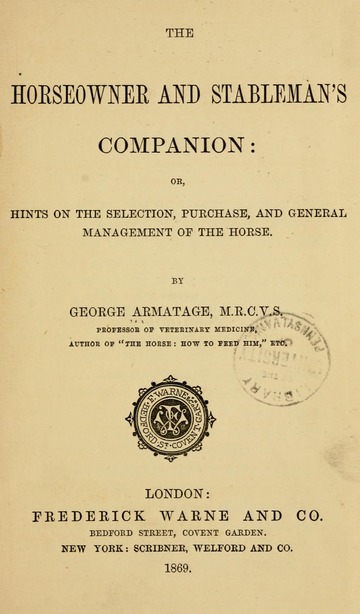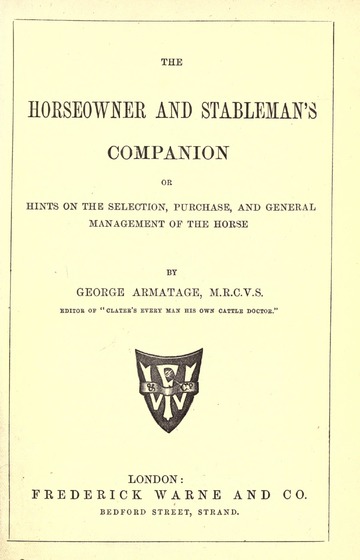

|
L’ouvrage est entièrement numérisé et disponible sur le site : |
||||||
|---|---|---|---|---|---|---|---|
| The Horseowner’s and Stableman’s Companion / ARMATAGE George, 1869 | |||||||
The horseowner and stableman’s companion, or, Hints on the selection, purchase, and
general management of the horse — by George Armatage, M.R.C.V.S., editor of "Clater’s
every man his own cattle doctor".
/
ARMATAGE George
|
|||||||
|
|||||||
| Anglais |
« That wich we may denominate success in the proper maintenance of our working horses
is derived from careful management. This applies with equal force to
all
our domestic animals.
To preserve their health and vigour through-out long years of usefulness, a knowledge
of their habits, capabilities and peculiarities, &c., is required. He who possesses
this is well armed, but he would be more perfect in having the ability and disposition
to apply it directly towards the mitigation of evil consequences which, alas, swell
up the mortality lists to a fearful degree. It should, in all cases, be the end and
object of the attention bestowed upon them.
Great misconception prevails upon this point. Disease and death continually occur
among our valuable animals, and owners have almost accepted the results as inevitable,
from which there is no escape. "The steed is stolen", and fruitless attempts are made
to rectify mistakes by the application of remedies which may not only prove useless,
but even very aggravating.
An old axiom has advised "Every man to his trade’’ It should be inscribed in legible
characters upon the walls of every building in which our domestic animals are kept.
Prevention of disease and mortality frequently consists in a respectful observance
of the hint and dangerous consequences are thereby commonly arrested or mitigated.
Since the issue of a
small work
uniform with the present volume, designed to draw especial attention to the benefit
and essentials of good management in one department only among horses, it is gratifying
to learn that the object of the writer has not been overlooked by the numerous readers.
While the question is one purely of scientific interest, and recognised as such; the
desire has become intensified that further information should at once be placed in
the hands of those who carry out the practical details. For this purpose the present
treatise has been asked for. Proprietors wish to have reduced to plain language the
formulce of scientific deduction, that "he who runs may read’ and thus extend a principle
which is being daily more and more acknowledged as pre-eminently useful and beneficial.
We, however, incur great risk in becoming dogmatical. It is more easy and pleasurable
to establish opinions on the foundation fortified by repeated accessions of scientific
memoranda illustrating cause and eftect; but we cannot wait to follow the intricacies
of the path,
results
only must be described, and the mechanism by which they are arrived at carefully
shrouded from the view.
Whether such a conclusion is justifiable, the keen sense of the public will rapidly
demonstrate. The useful being constantly aimed at by the author, he can only hope
his efforts may be accepted as heretofore by his numerous readers and the press generally,
whose comments have been of the most flattering character. (Leighton Buzzard, September
14
th
1868. » Présentation de l’éditeur (1869)
: alimentation , écuries , ferrure , maladies , prévention , prévention , race , soins

